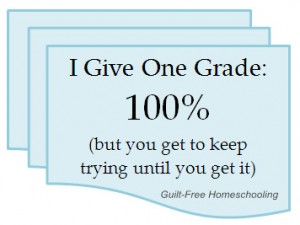A lesson learned is a lesson learned. We will not move on until you know it, but also we will move on as soon as you have learned it. If you know to start a sentence with a capital letter and put a period at the end, you probably do not need to do that for all 6 pages in the workbook!
If the child has learned the lesson, does it really matter how he/she learned it? It is the final results we are after: learning is learning no matter how long it takes. Did you read The Chronicles of Narnia or C.S. Lewis’ rough drafts of them? Did you wear the dress with the collar put on backwards, or did you fix it first? Did you give away batches of burned cookies for Christmas gifts or bake new ones? I give only one “grade” in our homeschool: it’s 100%, and you get to keep trying until you have made it. That does not always mean re-writing the math problems until they are perfect; it means we go over the concept until you have understanding. (Some kids need to write it, others just need to understand it.)
A public middle-school teacher (acting as the supervising teacher) recommended that a homeschool family not list any grade lower than an “A” on their transcripts or other official records. Her reasons: “The work your children are doing is far above the level of what their counterparts are doing in public school. Also, you are finishing every book — we never finish a book. Therefore, your children would be considered ‘A’ students in public school.”
In Mary Pride’s book Schoolproof, she relates a story of how her father (who taught philosophy) asked her what grade she would give to a student who had earned an “F” on his first test, a “D” on the second, a “C” on the next, then a “B”, and an “A” on the final exam. Young Mary thought carefully, and then replied that she would average a “C” for the course. She tells that her father shook his head and told her that she was wrong. The student had earned an “A” for the course, because he finally had mastered the material.



 Guilt-Free Homeschooling is the creation of Carolyn Morrison and her daughter, Jennifer Leonhard. After serious disappointments with public school, Carolyn spent the next 11 years homeschooling her two children, from elementary to high school graduation and college admission. Refusing to force new homeschooling families to re-invent the wheel, Carolyn and Jennifer now share their encouragement, support, tips, and tricks, filling their blog with "all the answers we were looking for as a new-to-homeschooling family" and making this website a valuable resource for parents, not just a daily journal. Guilt-Free Homeschooling -- Equipping Parents for Homeschooling Success!
Guilt-Free Homeschooling is the creation of Carolyn Morrison and her daughter, Jennifer Leonhard. After serious disappointments with public school, Carolyn spent the next 11 years homeschooling her two children, from elementary to high school graduation and college admission. Refusing to force new homeschooling families to re-invent the wheel, Carolyn and Jennifer now share their encouragement, support, tips, and tricks, filling their blog with "all the answers we were looking for as a new-to-homeschooling family" and making this website a valuable resource for parents, not just a daily journal. Guilt-Free Homeschooling -- Equipping Parents for Homeschooling Success!

Speak Your Mind